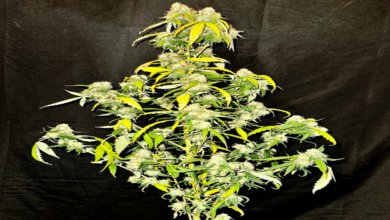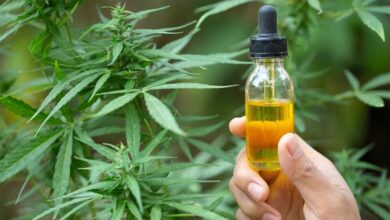A Beginner’s Guide to CBD | Endocannabinoid System – Cannabis Seedss

Cannabidiol, also called CBD, is an extract of the cannabis plant that is mixed with a carrier oil to make CBD oil. In states that have legislated recreational and medical cannabis, there are varieties of high CBD strain cannabis that you can buy at your regional dispensary.
CBD products are normally extracted from hemp instead of cannabis because they have more amounts of CBD as opposed to the larger amounts of Δ9-tetrahydrocannabinol (THC) that are found in cannabis. To extract CBD oil from hemp or the cannabis plant, a CBD extraction device is needed. Solvents such as ethanol are also used in this process. New extraction approaches for CBD oil, such as supercritical co₂, are now offered and make cleaner, more refined CBD products. This is because it balances the temperature and stress of the plant throughout the extraction, eliminating the demand for solvents.
Many medical professionals and users of natural and medicinal rely on the therapeutic aspect of CBD as an alternative medicine to reduce lots of symptoms to ease or play a possible function in the listed here conditions, according to the World Health Organization (WHO): “queasiness or throwing up, inflammatory digestive tract and Crohn’s disease, anxiety, stress and anxiety, psychosis, cancer, neuropathic discomfort, bronchial asthma, Alzheimer’s disease, Parkinson’s disease, rheumatoid arthritis, inflammatory disease, multiple sclerosis, cardiovascular diseases, diabetic difficulties, and infection.”.
CBD is generally well-tolerated and has a great safety profile. A substantial study from the scientific community constantly assesses the medicinal benefits of CBD. More research needs to be done to show the efficiency and long-lasting effects of this medicine.
The WHO reported in 2017 that no “public health-associated issues” have been associated with using pure CBD. The record ends, “In people, CBD shows no effects, a measure of any misuse or reliance possibility.” CBD is a generally safe alternative therapy, as long as you consult your physician to ensure that CBD won’t disrupt your other medications.
Understanding Difference Between CBD and THC?
Δ9-tetrahydrocannabinol (THC) is a chemical part that causes the intoxicating effects of the cannabis plant. However, high-CBD and low-THC strains of cannabis do not produce drowsiness, yet use the capacity to alleviate several disorders containing seizures.
What Are Cannabinoids?
Cannabinoids are chemical compounds that naturally occur in the cannabis plant. Cannabis contains around 150 cannabinoids; the two key and most recommended cannabinoids are THC and CBD. As cannabis research involves, we are learning more about different other cannabinoids like cannabigerol (CBG), cannabinol (CBN), and cannabichromene (CBC). These natural cannabinoids can play a considerable role in the endocannabinoid system, a system of the body that was not in the limelight till and is still being discovered.
The Endocannabinoid System
Although it is among the oldest biological systems of the body, you might have never come across the endocannabinoid system. Our bodies come equipped with this whole system that is responsible for handling a wide range of physical procedures. The endocannabinoid system, or ECS for brief, is a map of cannabinoid receptors positioned throughout the body.
The feature of the endocannabinoid system is to control a series of physical features such as mood, memory, fertility, food cravings, hormones, actions to discomfort or anxiety, and depression. In the long run, the ECS helps our bodies to maintain homeostasis or balance.
The exploration of the cannabinoids found in the cannabis plant affected the naming of the ECS. “From the minute when exogenous cannabinoids showed their presence, the whole natural compound also called the ‘endogenous cannabinoid system,’ or ‘endocannabinoid system’ (ECS),”. In simple words, endocannabinoids are the body’s natural endogenous cannabinoids. Endocannabinoids are natural chemicals that activate the cannabinoid receptors of the ECS.
Cannabinoids Interaction With the ECS
However, we also react to exogenous cannabinoids like those found in cannabis. Phytocannabinoids, “Phyto” meaning plant-derived cannabinoids, also connect to our receptors that initiate a physical action. Our receptors are the lock and cannabinoids are the secrets that unlock steps.
Recently, there are 2 well-known receptors in the ECS: CB1 and CB2. Both are distributed around the body; nonetheless, CB1 receptors are mainly found in our brain and nerve system, while CB2 receptors are pressed in our organs and immune system. Each of both sorts of receptors is responsible for maintaining the order of our immune and nervous system functions.
What is Entourage Effect?
There are thousands of different types of natural compounds found in the cannabis plant. When consumed, all of these cannabinoids and different other compounds interact and create a complete, well-rounded influence known as the entourage effect. Today, the term is used to explain how chemical parts synergistically interact to create phenomenal effects and improve the cannabis experience.
So what else contributes to the entourage effect? There are 6 significant cannabinoids:
- Δ9-tetrahydrocannabinol (THC)
- Cannabidiol (CBD)
- Cannabigerol (CBG)
- Cannabinol (CBN)
- Cannabichromene (CBC)
- Tetrahydrocannabivarin (THCV)
The last 4 are less recommended however are starting to get more interest. Terpenes are an additional element of the cannabis plant that develops the aromas of strains and are believed to contribute to the entourage’s effect. Cannabis scientists explain that terpenes can increase the body’s rate of absorption of cannabinoids. The entourage effect, simply put, is the concept that CBD is enhanced by the other cannabinoids and substances found in cannabis and/or hemp-derived plant drugs.
Is CBD Really Psychoactive?
CBD alone won’t produce an intoxicating action or get you high. CBD can be used to counteract the intoxicating effects of THC. However, it is important to note that CBD is practically psychoactive, meaning that it affects the brain.
CBD affects the brain in beneficial ways like relieving anxiety and stress and depression, boosting the mindset, improving anxiety, and helping with sleep. These are a few of its health benefits. It is more thoroughly used for discomfort and inflammation. Some that are a lot more watchful of their physiology could feel a refined uplift in their mood.
How Long Does CBD Stay in Your System?
Although there is a minimal amount of research on CBD and its effects on human beings, many experts suggest that CBD remains in your system for about three to 4 days before it is completely removed from your body, but the precision of this timeline is still disputed. One research found that the half-life of CBD has to do with two to 5 days 9.



